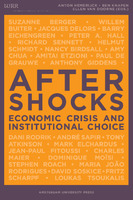Aftershocks
Economic Crisis and Institutional Choice
Author(s)
Hemerijck, Anton
Knapen, Ben
Doorne, van, Ellen
Language
EnglishAbstract
Aftershocks was written in the midst of the deepest economic crisis since the Great Depression. Although it would be premature to presume to identify the repercussions of the crisis, it is clear that it will have profound aftershock effects in the political, economic, and social spheres. The book contains essays based on semi-structured interviews with leading scholars, European politicians and representatives from the world of business. They reflect on the origins of the crisis as well as the possible social, economic, and political transformations it may engender. Aftershocks werd geschreven op het hoogtepunt van de grootste economische crisis sinds de grote depressie. Hoewel het voorbarig zou zijn aan te nemen dat de gevolgen van de crisis al in volle omvang duidelijk zijn, is het overduidelijk dat zij ingrijpende effecten zal hebben op politiek, economisch en sociaal gebied. Het boek bevat essays gebaseerd op interviews met vooraanstaande geleerden, Europese politici en vertegenwoordigers uit de wereld van het bedrijfsleven. Zij vertellen over de oorsprong van de crisis, maar ook over de mogelijke sociale, economische en politieke veranderingen die zij zal voortbrengen. Deze reflecties laten zien dat terugkeer naar de oplossingen voor de crisis van de jaren 1980 en 90, noch de herinrichting naar voorbeeld van de jaren 1950 en 60 de oplossingen bieden die wij nodig hebben om op binnenlands of mondiaal niveau deze crisis aan te pakken. Nodig blijkt namelijk dat de rol van de overheid en politieke soevereiniteit opnieuw uitgevonden moet worden om zo de crisis het hoofd te kunnen bieden. Een selectie uit de bijdragen: - Econoom Willem Buiter (LSE) spoort ons aan de unieke kansen die de crisis biedt om markten opnieuw te reguleren niet voorbij te laten gaan. Als nationale en internationale beleidsmakers niet nu handelen, bestaat het gevaar dat de instabiliteit van vóór de crisis terugkeert. - Politieke wetenschapper Suzanne Berger (MIT) laat zien wat de nationale ruimte voor sociale en economische verandering is in een langere periode van lage groei. - Oud-voorzitter van de Europese Commissie Jacques Delors ziet in de crisis een verkapte zegen. Een periode van lage groei dwingt politici te zoeken naar andere succesindicatoren dan het bruto nationaal product, zoals op het gebied van milieu en welzijn. - Econoom Barry Eichengreen (Berkeley) zet de huidige crisis af tegen de Grote Depressie van de jaren dertig en de stagflatiecrisis van de jaren zeventig. Ook schetst hij de politieke en economische voorwaarden voor herstel. - Politieke wetenschapper Peter A. Hall (Harvard) stelt dat de crisis bij uitstek ook een politiek probleem is: de staat moet op zoek naar nieuwe legitimiteit. - Econoom Dani Rodrik (Harvard) pleit voor een 'kapitalisme 3.0' dat economische globalisering en nationale diversiteit met elkaar in balans brengt. - Socioloog Richard Sennett (LSE) vindt dat de crisis de morele superioriteit van het vrije-marktdenken heeft ondermijnd maar tegelijkertijd kansen biedt voor een betere verdeling van welvaart en welzijn. Deze, en nog veel meer kwesties komen aan bod in essays van Tony Atkinson, Nancy Birdsall, Amy Chua, Amitai Etzioni, Paul de Grauwe, Anthony Giddens, André Sapir, Mark Elchardus, Jean-Paul Fitoussi, Charles Maier, Dominique Moïsi, Stephen Roach, Maria João Rodrigues, Helmut Schmidt, David Soskice, Fritz Scharpf en Loukas Tsoukalis. Aftershocks wordt ingeleid door Anton Hemerijck. Het boek sluit af met een beschouwing van Ben Knapen.
Keywords
economics; economie; Europe; European Union; GlobalizationDOI
10.5117/9789089641922ISBN
9789089641922OCN
607561681; 741348296Publisher
Amsterdam University PressPublisher website
https://www.aup.nl/Publication date and place
2009Series
WRR,Classification
Economics, Finance, Business and Management


 Download
Download